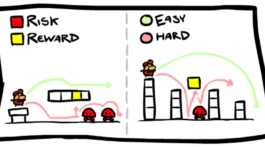Companies are always making many promises to its consumers. Use Product X to get smarter, prettier, happier, richer, and so on. It’s obvious many of these claims are promotional selling tactics – so how often, when we hear that a product can actually benefit you, are we inclined to believe them? Lumosity is a rapidly growing company that claims its games and activities can improve brain function – and they have the science and research to back it up. How the heck does Lumosity do this? Read on to learn about the startup that uses more scientists than marketers:
What is Lumosity?
Lumos Labs, the company behind Lumosity, creates simple online games to allow anyone to train their cognitive abilities. Both Lumosity’s web and mobile games are designed by scientists, with the goal to be both fun and adaptively challenging. Launched in 2007, CEO Steve Berkowitz’s San Francisco-based company has launched over 75 unique games to over 70 million registered users. Since launching, Lumosity’s revenue has grown by at least 25% every quarter, proving that people really are up for a challenge.
How Does It Work?
Users create a free account with Lumosity, and that’s it; you’re in. You’ll start with what Lumosity calls “finding your baseline”: users will play three different games to see how they compare to others in their age group. Once the baseline is determined, users receive daily “workouts” that challenge 5 different cognitive abilities. The games change based on your increasing skill, so they’ll always seem challenging to each unique user. Users can then track their score, view their best and worst tests, and see insights into what their training scores actually mean. Lumosity has worked with over 100 independent and university researchers to to ensure their games are developing cognitive skills that increase your memory, recall, and retention over time.
Is It Effective?
Of course, upon hearing about Lumosity, many people have this thought: do these games actually work in improving how well my brain works? Lumos Labs says yes, they do. Lumos Labs’ games are actually what’s called Neuro Cognitive Performance Tests (or NCPTs), and these tests have been evaluated in numerous studies to investigate validity. In these studies, groups who performed NCPTs had improved cognitive ability days later, over those who didn’t take any tests. Lumos Labs is working to use these NCPTs as not only fun games to play while you’re waiting in line, but to diagnose cognitive impairment in individuals. So yep, it’s safe to assume that these games actually do work, if you believe 100 scientists and 70 million users. Lumosity might just be be one of the only startups who can improve your life by playing games.




